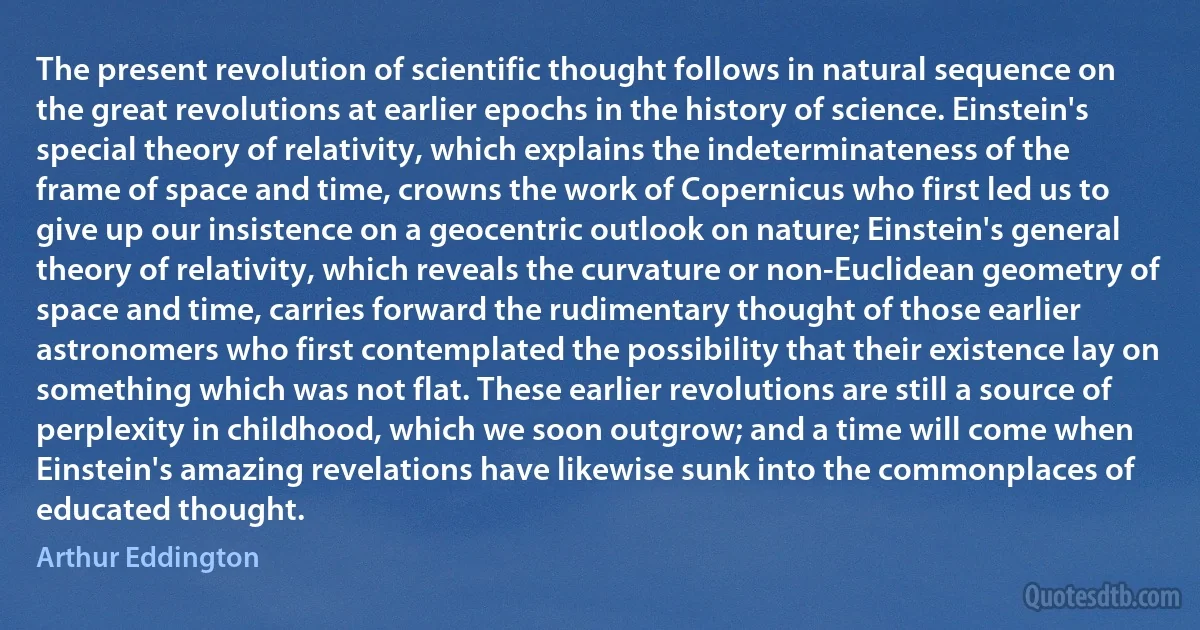
The present revolution of scientific thought follows in natural sequence on the great revolutions at earlier epochs in the history of science. Einstein's special theory of relativity, which explains the indeterminateness of the frame of space and time, crowns the work of Copernicus who first led us to give up our insistence on a geocentric outlook on nature; Einstein's general theory of relativity, which reveals the curvature or non-Euclidean geometry of space and time, carries forward the rudimentary thought of those earlier astronomers who first contemplated the possibility that their existence lay on something which was not flat. These earlier revolutions are still a source of perplexity in childhood, which we soon outgrow; and a time will come when Einstein's amazing revelations have likewise sunk into the commonplaces of educated thought.
Arthur EddingtonRelated topics
childhood curvature early forward frame general geometry great history insistence lay led likewise natural nature outlook perplexity possibility present relativity revolution rudimentary science sequence sink something source space thought time work CopernicusRelated quotes
I shall present a theory - which I call "the theory of the managerial revolution." During the past century, dozens, perhaps even hundreds, of "theories of history" have been elaborated. All of the theories, with the exception of those few which approximate to the theory of the managerial revolution, boil down to two and only two. The first of these predicts that capitalism will continue for an indefinite, but long, time, if not forever:' that is, that the major institutions of capitalist society, or at least most of them, will not be radically changed. The second predicts that capitalist society will be replaced by socialist society. The theory of the managerial revolution predicts that capitalist society will be replaced by "managerial society," that, in fact, the transition from capitalist society to managerial society is already well under way.

James Burnham
In conclusion, it appears to me that nothing can be more improving to a young naturalist, than a journey in distant countries. It both sharpens, and partly likewise allays that want and craving, which, as Sir J. Herschel remarks, a man experiences although every corporeal sense is fully satisfied. The excitement from the novelty of objects, and the chance of success, stimulate him to increased activity. Moreover as a number of isolated facts soon become uninteresting, the habit of comparison leads to generalization. On the other hand, as the traveller stays but a short space of time in each place, his descriptions must generally consist of mere sketches, instead of detailed observation. Hence arises, as I have found to my cost, a constant tendency to fill up the wide gaps of knowledge, by inaccurate and superficial hypotheses.

Charles Darwin
It is not true, out of geometry, that the mathematical sciences are, in all their parts those models of finished accuracy which many suppose. The extreme boundaries of analysis have always been as imperfectly understood as the tract beyond the boundaries was absolutely unknown. But the way to enlarge the settled country has not been by keeping within it, but by making voyages of discovery, and I am perfectly convinced that the student should be exercised in this manner; that is, that he should be taught how to examine the boundary, as well as how to cultivate the interior. ...allowing all students whose capacity will let them read on the higher branches of applied mathematics, to have each his chance of being led to the cultivation of those parts of analysis on which rather depends its future progress than its present use in the sciences of matter.

Augustus De Morgan
Comets are flying around the solar system. As they near the sun, they develop a tail as material is blown off by the solar wind. Most astronomers agree that comets cannot be more than 10,000 years old. They would have completely disappeared by now. Some scientists have recognized this as a serious problem for the theory that the earth is billions of years old, so they have proposed a new theory that new comets are constantly being introduced into the solar system to replace the old ones that burn out. They say they are coming from the "Oort Cloud.” No one has ever seen this Oort cloud, Oort never saw the Oort cloud! There is NO scientific evidence for its existence, but in their mind, this answers the serious problem the short lives of comets creates. There is a simpler answer, of course: the universe is NOT billions of years old!

Kent Hovind
He (Gauis Gracchus) was a political incendiary. Not only was the hundred years' revolution which dates from him, so far as it was one man's work, the work of Gaius Gracchus, but he was above all the true founder of that terrible civic proletariat flattered and paid by the classes above it, which was through it aggregation in the capital - the natural consequence of the largesses of corn - at once utterly demoralized and made conscious of its power, and which - with its pretensions, sometimes stupid, sometimes knavish, and its talk of the sovereignty of the people - lay like an incubus for five hundred years upon the Roman commonwealth and only perished along with it. And yet again, this greatest of political transgressors was the regenerator of his country. There is scarce a fruitful idea in Roman monarchy, which is not traceable to Gaius Gracchus.

Theodor Mommsen
